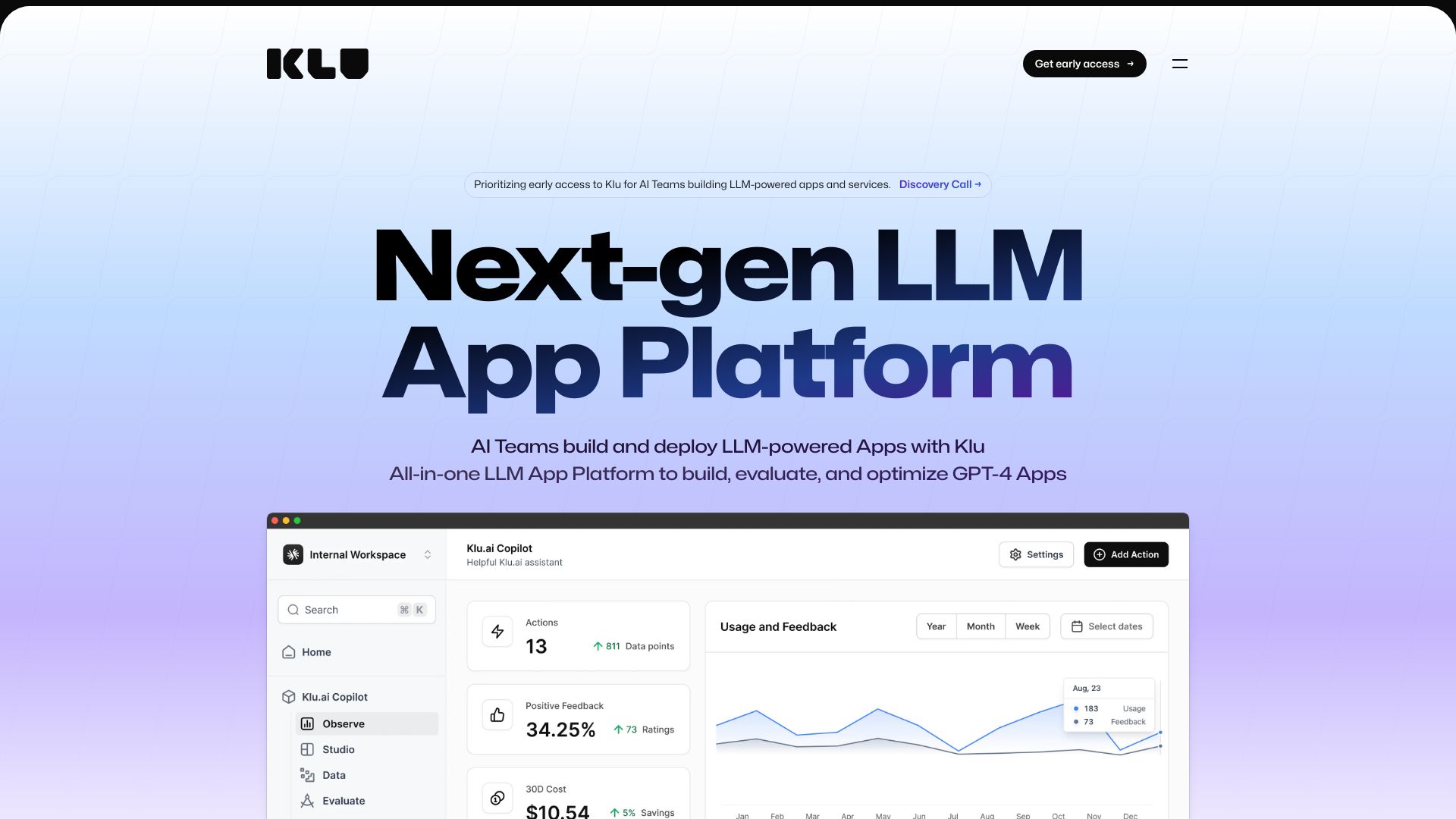- Home
- Prompt Engineering
- Klu AI

Klu AI
Open Website-
Tool Introduction:LLM app platform for teams: build, evaluate, fine-tune, deploy.
-
Inclusion Date:Nov 04, 2025
-
Social Media & Email:
Tool Information
What is Klu AI
Klu AI is an all-in-one LLM app platform that helps AI engineers and product teams build, deploy, and optimize generative AI applications. It unifies collaborative prompt engineering, automatic evaluation of prompts and model changes, and one-click fine-tuning. Klu connects securely to your data across databases, files, and websites, and to leading models like Claude, GPT-4, Llama, Mistral, and Cohere. With observability, versioning, and analytics, it accelerates iteration, captures user feedback, and curates training data to create differentiated AI experiences.
Main Features of Klu AI
- Collaborative prompt engineering: Version prompts, branch experiments, review changes, and manage templates with comments and roles for cross-team workflows.
- Automatic evaluations and A/B testing: Compare prompts and models with quality, cost, and latency metrics; run regression tests on golden datasets before shipping.
- 1-click fine-tuning: Curate high-quality examples from user interactions and evaluations, then fine-tune models to capture domain-specific behavior.
- Data integration and RAG: Connect databases, files, and websites; build retrieval-augmented generation pipelines with embeddings and vector stores.
- Multi-model orchestration: Seamlessly switch or route across GPT-4, Claude, Llama, Mistral, Cohere, and more to balance quality, cost, and speed.
- Production observability: Logs, traces, analytics, and guardrails to monitor failures, hallucinations, safety issues, and drift in real time.
- APIs, SDKs, and CI/CD: Ship to production with stable APIs, environment management, secrets, and integration into existing release pipelines.
- Governance and access control: Role-based access, audit trails, and policy controls to support enterprise requirements and data compliance.
Who Can Use Klu AI
Klu AI is built for AI engineers, ML engineers, product managers, and data teams who need to prototype and scale LLM features. Startups use it to ship chatbots, copilots, and search faster; enterprises adopt it for document QA, internal knowledge assistants, summarization, and workflow automation. Agencies and solutions teams leverage it to standardize prompt testing, reduce hallucinations, and deliver consistent results across clients and industries.
How to Use Klu AI
- Create a project and select your target models (e.g., GPT-4, Claude, Llama, Mistral).
- Connect data sources such as databases, file repositories, or websites to enable RAG.
- Draft prompts and few-shot examples; organize variants for different tasks or user segments.
- Build evaluation datasets and run automated tests to measure quality, cost, and latency.
- Add guardrails, safety checks, and retrieval settings; iterate on prompt and context strategy.
- Curate high-signal interactions into a training set and perform one-click fine-tuning.
- Integrate via SDK or API, set environments and secrets, and deploy to staging/production.
- Monitor logs, traces, and user feedback; schedule periodic evaluations and continue iterating.
Klu AI Use Cases
Teams use Klu AI to power customer support copilots that pull answers from knowledge bases, enterprise search and document QA with RAG, sales and marketing content generation with brand-safe prompts, contract and policy summarization, code assistants tuned on internal repositories, and analytics copilots that translate natural language to insights. These workflows benefit from robust evaluation, multi-model routing, and fine-tuning to capture domain expertise.
Pros and Cons of Klu AI
Pros:
- Unified platform for prompt engineering, evaluation, and fine-tuning reduces toolchain complexity.
- Automatic testing and analytics enable faster iteration and higher-quality releases.
- Seamless data integration and RAG support for grounded, context-aware answers.
- Broad model support and routing provide flexibility across quality, cost, and latency.
- Production-grade observability, guardrails, and governance for enterprise readiness.
Cons:
- Initial learning curve for teams migrating from custom or ad hoc LLM tooling.
- Evaluations and fine-tuning can add compute and API costs at scale.
- Relies on external LLM providers and data connectors, which may influence performance and SLAs.
- Advanced enterprise features may be more than small projects require.
FAQs about Klu AI
-
Which models does Klu AI support?
Klu AI integrates with leading LLMs including GPT-4, Claude, Llama, Mistral, and Cohere, with flexibility to switch or route per use case.
-
Does Klu AI support retrieval-augmented generation (RAG)?
Yes. You can connect databases, files, and websites, generate embeddings, and configure retrieval to ground model outputs in your data.
-
Can I fine-tune a custom model with Klu AI?
Yes. Klu AI lets you curate datasets from evaluations and user feedback, then perform one-click fine-tuning to capture domain behavior.
-
How does Klu AI handle evaluation?
It runs automated tests on datasets to measure quality, cost, and latency, supports A/B comparisons, and tracks changes with versioning.
-
Is Klu AI suitable for enterprise teams?
Yes. It offers role-based access control, observability, guardrails, and governance features suited to enterprise development and compliance.



